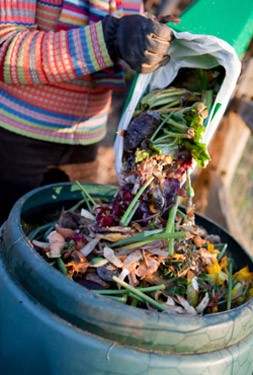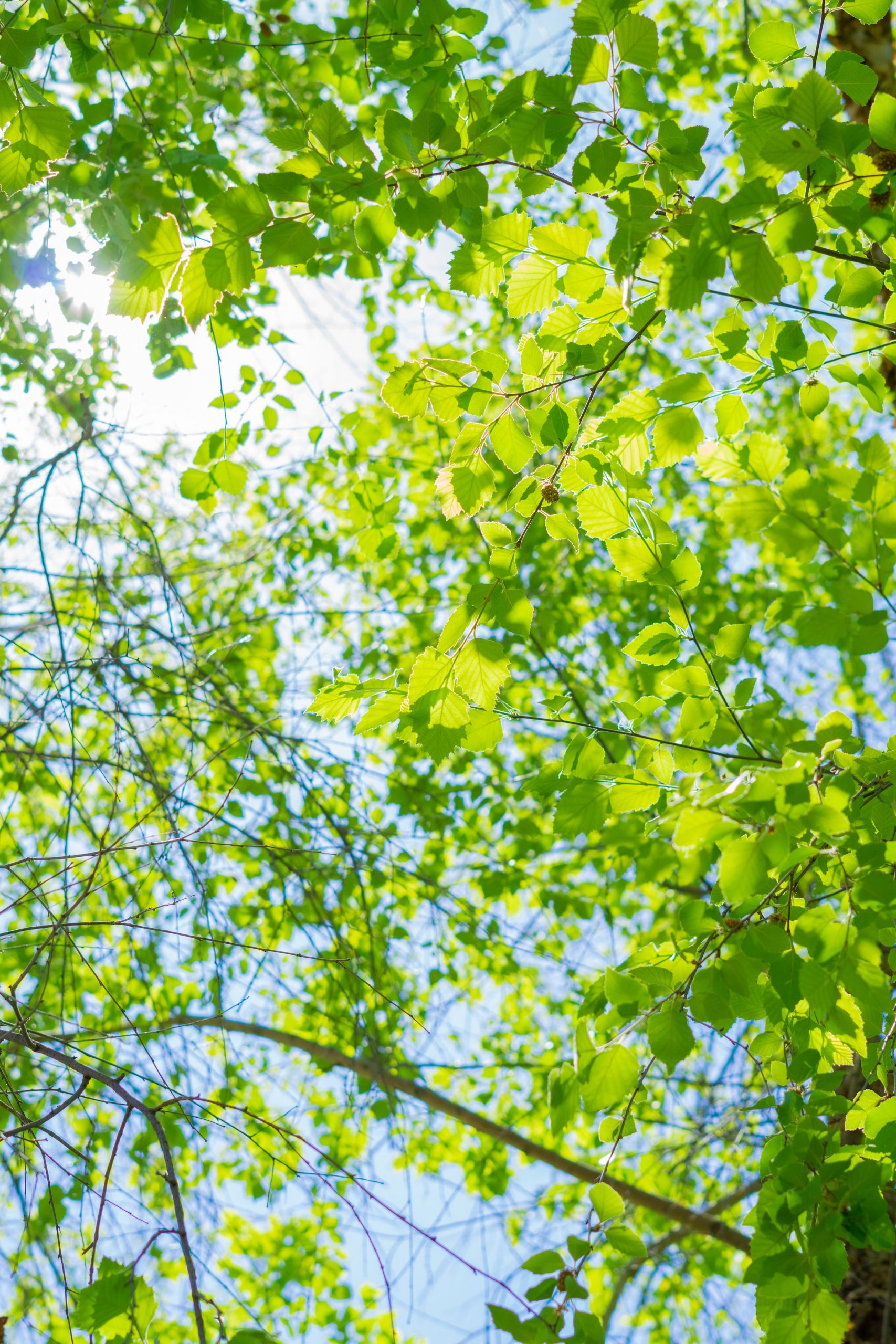Composting
Composting At Home
Composting is a natural process where organic materials decompose and are recycled into a dark, crumbly, earth-smelling soil conditioner known as compost.
Why compost?
It’s good for the environment: composting reduces the volume of material going to landfills, and instead turns the waste into a useful product. It’s good for your plants: compost improves soil structure and texture, increases aeration, and promotes soil fertility. Saves money, too!

Compost this material:
Vegetable scraps, fruit scraps, bread, flowers, grass clippings, corn cobs, coffee grounds & filters, tea bags, dry leaves, straw, hair, wood chips, wood ash, sawdust & shavings from regular lumber.
Don’t compost this stuff:
Food with grease or oil residue, meat scraps or bones, dairy products, used facial tissues, diseased or insect-infested plants, weed seed heads, inorganic or synthetic material, dryer lint, dog/cat feces, barbecue ash/coals, dust from pressure-treated lumber/composites/plywood. Also skip the “biodegradable” plastic utensils and bags which only industrial-scale systems can effectively break down.
Meat scraps, bones, dairy products, and solid pet feces can be digested by a sun-heated compost device, although the resulting material is not suited for use on garden beds. Check it out:
http://www.greenconeusa.com/green-cone-solar-food-waste-digester.html
For more information . . .
Rutgers Cooperative Extension Fact Sheet on Home Composting
Mercer County Master Gardeners’ Guide To Back Yard Composting
Cornell Waste Management Institute > Composting
University of New Hampshire: Composting for the Home Gardener
http://www.howtocompost.org
The Spruce: How to Make Compost in 4 Easy Steps
Reddit forum: https://www.reddit.com/r/composting/
Visit the Mercer Educational Gardens demonstration site at 431A Federal City Rd., Pennington to see examples of different kinds of compost structures, and to pick up more tips on how to be a successful composter.
The Wirecutter (NY Times) published an article, How to Start Composting with up-to-date tips.
Books about composting available in the Mercer County Library catalog:
- The Complete Compost Gardening Guide by Barbara Pleasant (2008)
- Compost: A Family Guide to Making Soil From Scraps by Ben Raskin (2014)
- Compost It by David Barker (2010) — short guidebook for kids
- Compost Science For Gardeners: Simple Methods For Nutrient Rich Soil by Robert Pavlis (2023)
- The Compost Specialist: The Essential Guide to Creating and Using Garden Compost, and Using Potting and Seed Composts by David Squire (2009)
- Composting: An Easy Household Guide by Nicky Scott (2007)
- Composting Basics: All the Skills and Tools You Need to Get Started by Eric Ebeling, Carl Hursh and Patti Olenick (editors) (2017)
- How to Build, Maintain, and Use a Compost System by Kelly M. Smith (2015)
- No-Waste Composting: Small-Space Waste Recycling, Indoors and Out by Michelle Balz (2021)
- The Rodale Book of Composting (1992)
- Teaming With Bacteria: The Organic Gardener’s Guide to Endophytic Bacteria and the Rhizophagy Cycle by Jeff Lowenfels (2022)
Curbside Compost Services
Residents of Hopewell Valley are able to subscribe to regular curbside pick-up of their food waste by a local service:
Additional composting services available in other New Jersey communities:
Do you have a composting service/business? Please let us know via email (hvgreenteam@gmail.com) so we can list it, too – no cost or obligations.
Vermiculture (Worm Bin Composting)
With the help of worms a lot of food waste can converted to excellent organic plant food inside your home year-round. Eisenia Fetida, known as Red Wigglers or Tiger Worms (and other names), are adapted to live and prosper in decaying organic matter, such as an indoor compost bin. They are not found in the soil of a garden or elsewhere outside where temperatures can get too cold. Red Wigglers used in composting are classified as epigeic.
A happy and well-behaved gang of worms, along with their roommates (organisms like bacteria, springtails, mites who also participate in the work of composting), will generate rich castings and some slightly smelly, watery leachate. The castings are considered “black gold” and can be harvested to use in your garden, either as amendments mixed into the soil or seeped in water to produce “worm tea,” which can be used like a liquid fertilizer. The leachate is sometimes mistakenly referred to as worm tea; while it may contain some beneficial nutrients, it’s probably best to dump it into your outdoor yard waste compost pile.
The shortest path to getting started is buying a pre-fab kit including a plastic multi-tray bin, some bedding material, helpful tools, guidebook and, of course, the proper worms. Plans for making your own worm composting system using wood boxes, plastic tubs or buckets are abundant in books and on the web. One example is found here:
https://www.thewormfarm.net/images/faq-pdfs/TWF_do_it_yourself_wormbin.pdf
Helpful information & commercial worm composting suppliers:
- “Worms Eat My Garbage” by Mary Appelhof
- http://www.wormwoman.com/ (continuing the work of Mary Appelhof)
- “The Earth Moved: On the Remarkable Achievements of Earthworms” by Amy Stewart
- https://rodaleinstitute.org/vermicomposting-for-beginners/
- https://www.epa.gov/recycle/composting-home#worms
- https://catalog.extension.oregonstate.edu/em9034 “Composting with Worms” [PDF]
- https://ed.ted.com/lessons/vermicomposting-how-worms-can-reduce-our-waste-matthew-ross
- https://urbanwormcompany.com/
- https://shop.thesquirmfirm.com/
- https://thebluewormbin.com/
- https://unclejimswormfarm.com/
- https://www.redworms.com/
- https://composta.myshopify.com/
- http://www.greenconeusa.com/wormchalet.html
An interesting personal essay: “How I Went from a Non-Recycler to a Vermicompost Queen” by Ariel Kanter on Modern Farmer website.
